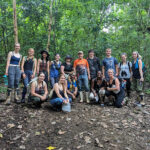
Wooster sophomore’s investigative work published by The Pulitzer Center

WOOSTER, Ohio – Sam Boudreau, a rising sophomore at The College of Wooster, was forced to pivot this summer from bird watcher to watchdog, and he may look back it as a fortuitous moment as his work as an investigative journalist culminated with a piece, “COVID-19 Takes Toll at Mississippi Veterans Home: ‘I Just Wanted My Dad to Have a Chance’,” that was published by The Pulitzer Center.
The Pulitzer Center helps raise awareness of underreported global issues by supporting quality journalism across all media platforms and partnering with news outlets, including U.S. regional and local outlets to ensure that diverse audiences are being reached. Founded in 2006, the nonprofit has grown from commissioning nine reporting projects its first year to more than 150 per year.
Boudreau, who intends to major in sociology with a minor in English, had been excited for months about his “dream” internship at the National Aviary in Pittsburgh, Pa., but when it was cancelled due to the coronavirus pandemic, the avid birder was flexible and fortunate enough to quickly refocus on another opportunity. Supported by Wooster’s Becky DeWine Endowment Fund, he found a position with the Mississippi Center for Investigative Reporting (MCIR), which sponsors a series called “Poverty & the Pandemic.”
With guidance from Jerry Mitchell, an award-winning reporter whose work helped lead to the conviction of four Klansmen who were responsible for some of the most infamous crimes in Mississippi history, Boudreau started examining COVID-19’s impact on aging patients in veterans facilities there. He began looking at the Center for Disease Control and Prevention’s Social Vulnerability Index, a tool that helps identify communities that are at severe risk from the pandemic, and found high levels in Kosciusko, where a state Veterans Home sits. He then read in the local newspaper there were 31 COVID-19 cases and one death at the home as of May 6, a “shocking” discovery since the virus had just made its way into Mississippi.
While Boudreau had a lead, he was unsure the next steps to be taken, so he turned to one of Generation Z’s familiar investigative tools – social media. “As an intern, I really didn’t know where to start when it came to finding sources for a story, so I looked on the Home’s Facebook page hoping to find anything,” he explained. In the comments section, he came upon Marcy Mills, a daughter of one of the patients, expressing concern over her father’s care. Several interviews and additional sources later, Boudreau had 1,400 well-crafted, eloquent words later, a piece worthy of a professional journalist. In fact, it was published by not just The Pulitzer Center, but also The Clarion-Ledger, Mississippi’s top daily newspaper, and on the MCIR’s website.
One person impressed, but not surprised to see Boudreau’s byline in major media outlets was Tom Tierney, a professor of sociology and anthropology at Wooster. “(Sam) emailed me earlier this summer to share his concern about the impact that the COVID pandemic was having on aging patients in veterans facilities in Mississippi, as well as his excitement about being able to bring these disturbing conditions to light. Given the pride he takes in his work, I am not at all surprised that Sam’s article was featured by The Pulitzer Center. He has accomplished much in his first year at the College, and I am excited to witness Sam’s continued growth and development.”
Time will tell if this was the dawn of a successful journalism career for Boudreau, who has several other interests as treasurer of the sociology and anthropology student organization, trombonist in the Wooster Jazz Ensemble, and deejay for the student radio station. The summer internship and subsequent publication certainly piqued his interest, and served as a valuable learning experience. “I am still searching for a career goal, but this internship definitely sparked my interest into investigative reporting,” he said. “The most important lesson I learned in this internship is the importance of truth and kindness. Being kind to people, even if they’re rude to you … is so important in investigative work. I learned that sources might treat you rudely or unpleasantly, but the most important thing is that you do your job and treat others with kindness, and the job here is to report the truth.”
Posted in Experiential Learning on August 18, 2020.
Related Posts
Related Areas of Study
Anthropology
Use problem-solving and research skills to explore and understand communities and cultures in every part of the world.
Major Minor

